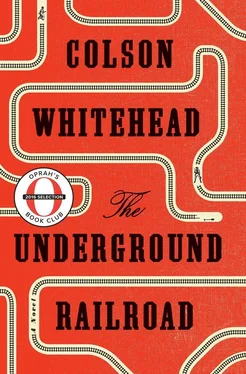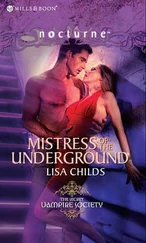Preoccupied by her uncomfortable refuge and the parade of misfortunes since the slave catchers found them out, Cora did not immediately notice an important feature of the park: Everyone was white. She had never left the plantation before she and Caesar ran away, so South Carolina gave Cora her first glimpse of the mingling of races in towns and cities. On Main Street, in stores, in factories and offices, in every sector, black and white mixed all day as a matter of course. Human commerce withered without it. In liberty or bondage, the African could not be separated from the American.
In North Carolina the negro race did not exist except at the ends of ropes.
Two able young men helped the matrons hang a banner over the bandstand: Friday Festival. A band took its place onstage, the sounds of their warming up gathering the scattered parkgoers. Cora hunkered and pressed her face to the wall. The banjo man displayed some talent, the horn player and fiddler less so. Their melodies were bland in comparison to those of the colored musicians she’d heard, on Randall and off, but the townspeople enjoyed the denatured rhythms. The band closed with spirited renditions of two colored songs Cora recognized, which proved the most popular of the night. On the porch below, Martin and Ethel’s grandchildren squealed and clapped.
A man in a rumpled linen suit took the stage to deliver a brief welcome. Martin told Cora later that this was Judge Tennyson, a respected figure in town when abstemious. This night he tottered. She couldn’t make out the judge’s introduction of the next act, a coon show. She’d heard of them but had never witnessed their travesties; the colored evening at the theater in South Carolina offered different fare. Two white men, their faces blackened by burned cork, capered through a series of skits that brought the park to exuberant laughter. Dressed in mismatched, gaudy clothes and chimney-pot hats, they molded their voices to exaggerate colored speech; this seemed to be the source of the humor. A sketch where the skinnier performer took off his dilapidated boot and counted his toes over and over again, constantly losing his place, generated the loudest reaction.
The final performance, following a notice from the judge regarding the chronic drainage issues at the lake, was a short play. From what Cora put together from the actors’ movements and the bits of dialogue that traveled to her suffocating nook, the play concerned a slave — again, a white man in burned cork, pink showing on his neck and wrists — who ran north after a light rebuke from his master. He suffered on his journey, delivering a pouty soliloquy on hunger, cold, and wild beasts. In the north, a saloon keeper took him on. The saloon keeper was a ruthless boss, beating and insulting the wayward slave at every turn, stealing wages and dignity, the hard image of northern white attitudes.
The last scene depicted the slave on his master’s doorstep, having once again run away, this time from the false promises of the Free States. He begged after his former position, lamenting his folly and asking for forgiveness. With kind and patient words, the master explained that it was impossible. In the slave’s absence, North Carolina had changed. The master whistled and two patrollers ushered the prostrate slave from the premises.
The town appreciated the moral of the performance, their applause resounding through the park. Toddlers clapped from the shoulders of their fathers, and Cora caught Mayor nipping at the air. She had no idea of the size of the town but felt that every citizen was in the park now, waiting. The true purpose of the evening revealed itself. A sturdy-built man in white trousers and a bright red coat took command of the stage. Despite his size, he moved with force and authority — Cora recalled the mounted bear in the museum, posed at the dramatic moment of his charge. He twisted one end of his handlebar mustache with patient amusement as the crowd quieted. His voice was firm and clear and for the first time that evening Cora did not miss a single word.
He introduced himself as Jamison, though every soul in the park was aware of his identity. “Each Friday I awake full of vigor,” he said, “knowing that in a few hours we’ll gather here again and celebrate our good fortune. Sleep used to come so hard to me, in the days before our regulators secured the darkness.” He gestured to the formidable band, fifty-strong, who had assembled at the side of the bandstand. The town cheered when the men waved and nodded at Jamison’s acknowledgment.
Jamison caught the crowd up. God had given one regulator the gift of a newborn son, and two others had observed their birthdays. “We have a new recruit with us tonight,” Jamison continued, “a young man from a fine family who joined the ranks of the night riders this week. Come on up, Richard, and let them have a look at you.”
The slender red-haired boy advanced tentatively. Like his fellows, he wore his uniform of black trousers and white shirt of thick cloth, his neck swimming in the collar. The boy mumbled. From Jamison’s side of the conversation, Cora gathered that the recruit had been making the rounds of the county, learning the protocols of his squad.
“And you had an auspicious start, didn’t you, son?”
The lanky boy bobbed his head. His youth and slight frame reminded Cora of the engineer of her last train trip, inducted by circumstance into the work of men. His freckled skin was lighter-hued, but they shared the same fragile eagerness. Born the same day, perhaps, then steered by codes and circumstances to serve disparate agencies.
“It’s not every rider who makes a catch his first week out,” Jamison said. “Let’s see what young Richard has for us.”
Two night riders dragged a colored girl onstage. She had a house girl’s tender physique and shrank further in her simpering. Her gray tunic was torn and smeared with blood and filth, and her head had been crudely shaved. “Richard was searching the hold of a steamship bound for Tennessee when he found this rascal hiding below,” Jamison said. “Louisa is her name. She absconded from her plantation in the confusion of the reorganization and hid in the woods these many months. Believing she had escaped the logic of our system.”
Louisa rolled over to survey the crowd, lifted her head briefly, and was still. It would have been difficult to make out her tormentors with all the blood in her eyes.
Jamison raised his fists in the air, as if daring something in the sky. The night was his opponent, Cora decided, the night and the phantoms he filled it with. In the dark, he said, colored miscreants lurked to violate the citizens’ wives and daughters. In the deathless dark, their southern heritage lay defenseless and imperiled. The riders kept them safe. “We have each of us made sacrifices for this new North Carolina and its rights,” Jamison said. “For this separate nation we have forged, free from northern interference and the contamination of a lesser race. The black horde has been beaten back, correcting the mistake made years ago at this nation’s nativity. Some, like our brothers just over the state line, have embraced the absurd notion of nigger uplift. Easier to teach a donkey arithmetic.” He bent down to rub Louisa’s head. “When we find the odd rascal, our duty is clear.”
The crowd separated, tutored by routine. With Jamison leading the procession, the night riders dragged the girl to the great oak in the middle of the park. Cora had seen the wheeled platform in the corner of the park that day; children climbed and jumped on it all afternoon. At some point in the evening it had been pushed beneath the oak tree. Jamison called for volunteers, and people of all ages rushed to their places on either side of the platform. The noose lowered around Louisa’s neck and she was led up the stairs. With the precision born of practice, a night rider threw the rope over the thick, sturdy branch with a single toss.
Читать дальше












